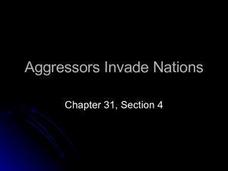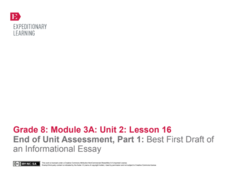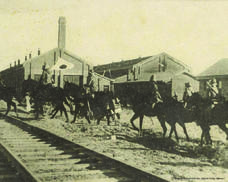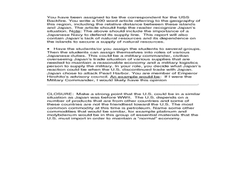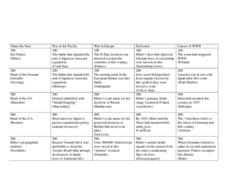Curated OER
Aggressors Invade Nations: WWII
What makes a World War? As it sounds, it's a war in which the world is involved. This presentation really defines the struggles, invasions, and conflicts that occurred all over the globe at the dawn of the Second World War. It describes...
US National Archives
WWII: The Pacific 1939-45 – Pearl Harbor
Though December 7th, 1941 was a day "which would live in infamy," World War II had provided many infamous days, events, battles, and atrocities in the years before. So why were American forces so surprised when Japan attacked Pearl...
Curated OER
The End of the War: WWII
Enhance your student's reading with this presentation on the end of WWII. This series of slides contains information, focus questions to guide student reading, and a video entitled, The Impact of World War II. Note: To view the...
Curated OER
Post-WWII De-Colonization
The end of WWII brought big changes around the world, not the least of which occur in the increasingly decolonized continent of Africa. This slideshow details the developing countries of Ghana, Kenya, Congo, Nigeria, and South Africa, to...
Curated OER
Good Time and Bad: Roaring 20's, Great Depression, and WWII quiz
Quiz your students on various topics related to the Roaring 20's, The Great Depression, and WWII. They'll ace any test after viewing this slide show. Tip: Turn this quiz into a game, see which side of the class is ready for the test.
Lincoln-Sudbury Regional High School
WWII Position Paper
There are some historical events that may warrant greater reflection and more in-depth analysis, and the decision to intern Japanese-Americans in the United States during World War II, as well as to drop the atomic bomb on Hiroshima and...
Curated OER
Lost Names: Scenes From a Korean Boyhood,
What a great resource to share! Based on the book Lost Names by Richard Kim, this valuable instructional activity focuses on the Japanese occupation of Korea during WWII. Additionally, it employs first-person journaling as a mode of...
US National Archives
WWII: The Pacific 1939-45 – Japan and the Atom Bomb
Though the scientists who developed the atom bomb did not believe it should be used to end World War II, American President Harry S. Truman and British Prime Minister Winston Churchill were of like mind in their decision to drop the bomb...
US National Archives
WWII: The Pacific 1939-45 – Iwo Jima
Of the images that have permeated history to define American courage, perseverance, and patriotism, the 1945 photograph of United States Marines raising the flag at Iwo Jima is one of the most well known. After researching the pivotal...
Curated OER
My Secret War: Lesson 8
Fifth graders explore American history by viewing videos on the Internet. In this Japanese internment instructional activity, 5th graders discuss the politics that took place between America and Japan during WWII and why it was necessary...
Curated OER
Why do wars occur?
Understanding the causes of war is one way (possibly) to prevent it. World War II is used as a case study to facilitate an understanding of reasons why wars start. Topics covered included Totalitarianism, scarcity of resources, need for...
Curated OER
American Foreign Policy: 1920 - 1941
Take your class through the period between World War I and World War II. Covering various treaties and pacts between America and its neighbors - namely, Japan, Germany, and the Soviet Union- these slides could inspire some political...
Rutgers University
How the Allies Won World War II: Island-hopping in the Central Pacific
Using primary source documents, young historians explore the strategies the US used to defeat Japan during WWII. They also learn about the American military experience, and innovations that changed the style of warfare. Learners benefit...
EngageNY
End of Unit Assessment, Part 1: Best First Draft of an Informational Essay
This is just the beginning. Learners take the first step toward their end-of-unit assessments of Unbroken. They use their tools and knowledge gained from the unit to create first drafts of their informational essays. Writers then respond...
Curated OER
Coming of Age Readings: Experiences in Korea and by Asians in America
Bring multi-cultural experiences and literature into your language arts class with this lesson. Here, young readers explore the points of view of first and second-generation Asian immigrants with a list of various fiction and nonfiction...
National WWII Museum
Picturing the War in the Pacific Photos, Datelines and Captions
Young historians have the opportunity to see photos from the war in the Pacific and learn more about what each photo represents. Scholars use their knowledge of WWII to match dates and descriptions to real-life photos from the war. The...
Center for History Education
Japanese American Internment During World War II
World War II turned nations against each other and neighbors into enemies. An eye-opening instructional activity explores the dark past of Japanese-American internment camps during WWII. Scholars learn of the fear and distrust toward...
Curated OER
Sadako and the Thousand Paper Cranes
Third graders explore their culture in comparison to Japanese culture by reading the book, Sadako and the Thousand Paper Cranes. They identify islands of Japan, create a Venn diagram comparing Japanese culture to American culture, and...
Curated OER
Who Were the Dissidents?
Students discover how Japanese dissidents spoke out against the injustice practiced in Imperial Japan. In this Japanese history lesson, students listen to a lecture about the silent dissidents in the nation prior to World War II and the...
Curated OER
Pre-WWII Pacific W/Japan
Eleventh graders explain how the islands/countries contributed to Japan's war effort. They study the concept of location and determine how natural resources were a large factor in Japan's trade.
Curated OER
Jeopardy Review for WWII
Students participate in a Jeopardy-style review game for a quiz on WWII. They divide into teams, choose team captains and answer a variety of questions pertaining to the study of WWII.
Curated OER
WWII and the Atomic Bomb
Students explore three decisions about the atomic bomb faced by the U.S. during WWII, take a position on each of the decisions, and defend their position. Should a bomb have been built, dropped, and was the right decision made?
National WWII Museum
Strategic Decision Making in the Pacific Scenarios
Individuals decide what they would do when faced with a difficult military decision that puts others' safety in jeopardy. The lesson also gives the real-life outcomes of the scenarios that occurred during World War II to give them a...
Curated OER
Leaders, Laborers, and Other Perspectives of World War II
How did the women in France feel about their country’s involvement in World War II? Class groups are assigned a country involved in WWII, and individuals within the group adopt the point of view of leaders, laborers, businessmen, women,...


